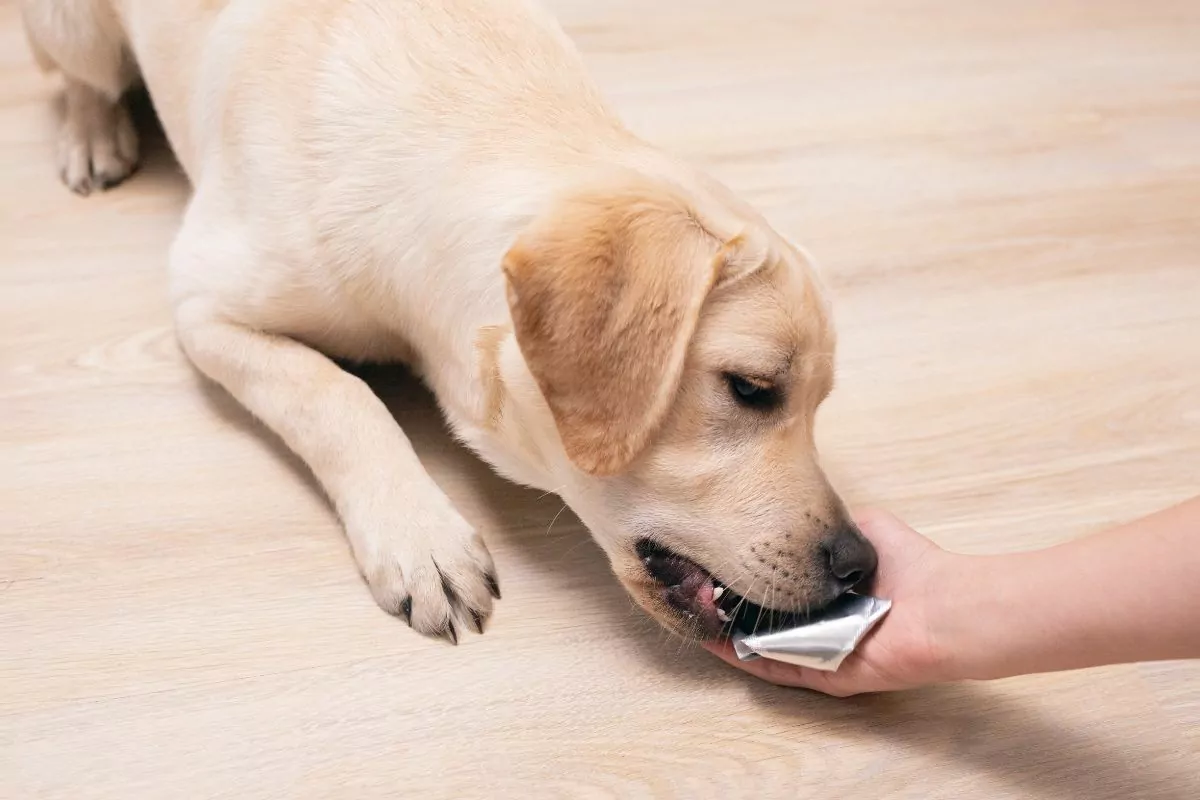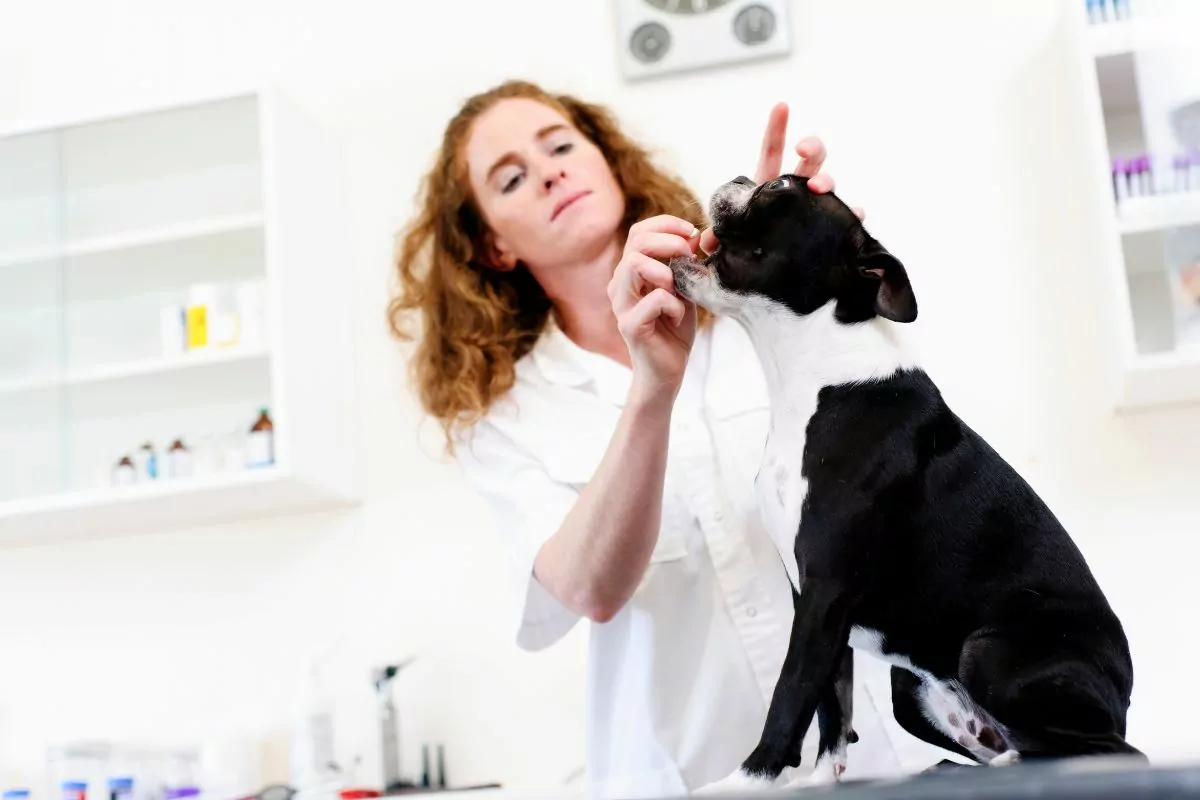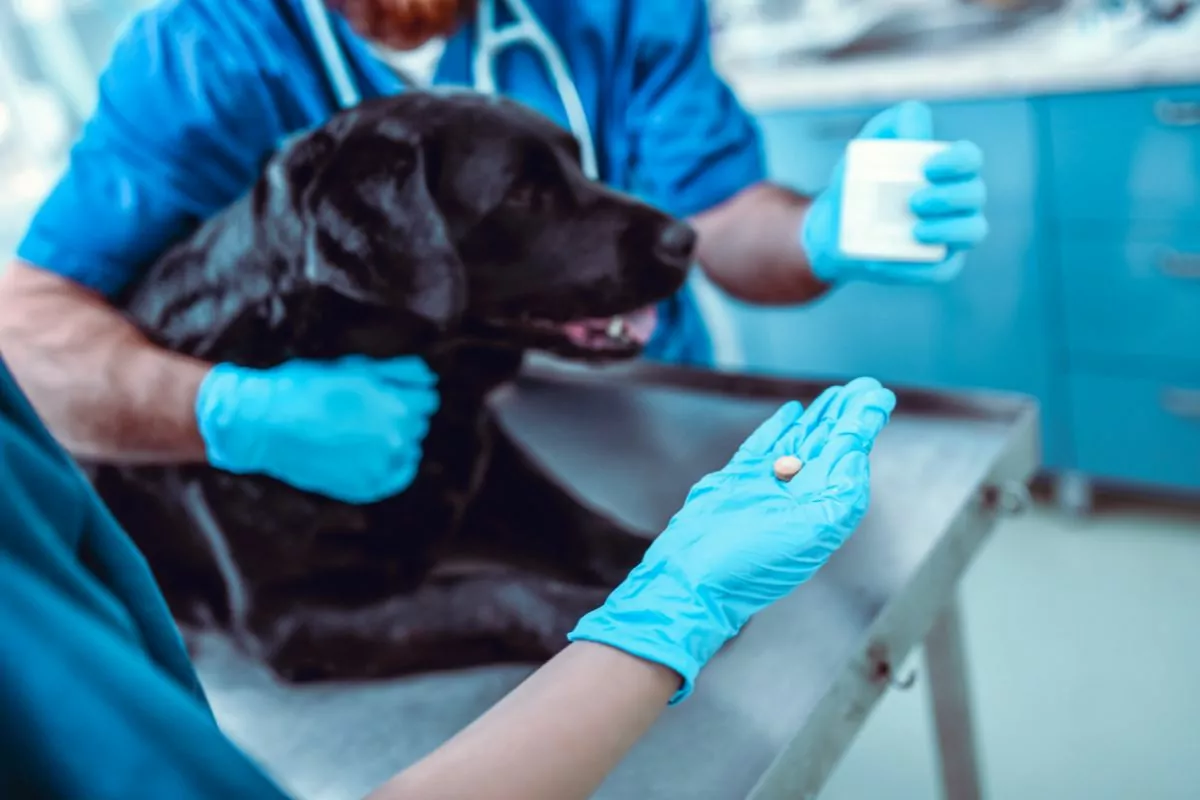What is Panacur for dogs?
Panacur for dogs is a medication containing the active substance Fenbendazole. It aims to protect your canine from harmful intestinal parasites. In regards to Febendazole’s side effects – they are minimal if any.
So what is Panacur for dogs exactly prescribed for? It removes various parasites such as roundworms (Toxocara Canis), hookworms, lungworms, whipworms, and certain types of tapeworms in dogs.
Even though It can be effective against the Taenia tapeworm species, it is not effective against the common tapeworm, Dipylidium caninum. It is also effective against Giardia (an intestinal protozoan that commonly causes diarrhea in puppies) and even some flukes.
It is often used also as a dewormer in horses, cattle, swine, birds, and a variety of small animals.

The Different Forms of Canine Panacur
Canine Panacur is available in three different forms:
- Oral suspension / liquid
- Granules / powder
- Paste
It is easy and convenient to give to dogs. Mix the appropriate dose in a small amount of canned food. Then continue feeding the dog its normal amount of daily food portion. They won’t even know sneaky Panacur was hiding in their meal!
Proper Dosage Instructions for Panacur
For roundworms, hookworms, whipworms, and tapeworms, 0.002oz/2.2lb (50mg/kg) administered orally accompanied by food for three days consecutively.
For Giardia, take 0.002oz/2.2lb (50mg/kg) orally daily with food for three to five days.
To prevent transplacental and transmammary transmission of T.canis and A. caninum, 0.002oz/2.2lb (50 mg/kg) once daily starting from the 40th day of gestation leading up to the second week of lactation.
Panacur is effective when given for several days. It is not a one-dose drug.
Dog caregivers should not miss giving a dose and should not abruptly stop administering the medication earlier even if they think their pup is gastrointestinal parasite free! This conclusion could be far from the truth leading to a possible relapse.
Always consult your veterinarian before administering any medications to your precious pets. They will give you the best advice to help your furry friend without unnecessary complications.
Does Panacur for Dogs Have Side Effects?
Panacur dewormer for dogs does not generally cause any side effects at usual dosages. However, at higher doses, hypersensitivity reactions have been noted. These reactions occur as the parasites are under attack and dying.
Be aware of any allergic symptoms, and if present, contact your veterinarian immediately.
Manufacturers advise that administering Panacur dewormer for dogs can infrequently lead your dog to exhibit GI upset symptoms such as salivation, vomiting, and diarrhea. Call your veterinarian to help ease your dog’s symptoms.
What is Canine Panacur Used for?
Canine Panacur is an antiparasitic medication.
So essentially, it’s for the days that your trip to the veterinarian concludes with “your dog has internal parasites.” Don’t panic, and take a deep breath. Worms in dogs are quite common, and the great news is they are treatable!
Panacur dewormer for dogs is an oral dewormer used and trusted in many species of animals, not only for the beloved canines.
It helps get rid of parasitic infections. It is used in dogs over six months of age as a routine dewormer given twice a year, acting as a preventative measure.
Deworming schedules can vary depending on where you live, your dog’s activity, and their husbandry situation. As general guidance, here is an example of a plan that one can follow for preventative deworming :
Deworming of pups starts at 6 to 8 weeks old. Subsequent deworming every two weeks for the first three months (at 6, 8, 10, and 12 weeks). The tired mom is treated simultaneously with her litter to avoid persistent infection.
How Does Panacur for Dogs Work?
Deworming medications work in various ways to eliminate parasites. Some target life stages, while others attack the biological mechanisms of the parasite.
Fenbendazole is a methyl carbamate benzimidazole antiparasitic agent with broad spectrum activity.
The benzimidazole mechanism of action disrupts the intracellular microtubular transport systems along with the parasites’ metabolic pathways. Fenbendazole kills parasites by finally destroying their metabolic enzyme action.
Is Panacur Safe for Nursing Dogs?
Is Panacur safe for nursing dogs? This is a frequently asked question, and the answer is yes, it most certainly is!!
It is considered safe for pregnant and lactating dogs, making it the drug of choice when fighting a giardia infection during pregnancy.
How to Administer Canine Panacur Safely
To safely administer Panacur dewormer for dogs, always follow your veterinarian’s schedule and guidelines.
Do not change the dosage of a drug, frequency, or even administration route before consulting your vet.
It is an easy-to-administer medicinal product in various forms: powder, paste, or liquid.
Mixing Panacur (bonus points to Panacur liquid for dogs ) into your dog’s meal is easy and possible for all forms of the drug, taking the hassle out of administration.
When giving Febendazole, always give it accompanied by food and ensure your dog consumes the intended quantity of medicated food. A dose may be missed unintentionally, thus hindering the recovery process.

What Happens if I Miss a Dose?
When administering Panacur, it is in the best interest to not miss any doses and by no means stop the medication earlier than scheduled.
It is not the end of the world, obviously, and these mistakes happen, especially when we are all very busy during our days and have to remember multiple tasks; something will inevitably slip.
If you have missed giving a dose, the most appropriate route is to inform your veterinarian primarily. They will advise you to either skip the quantity or continue treating your dog for a few days longer.
Do not give a double dose to make up for the amount missed.
Potential Risk Factors Coupled With Panacur for Dogs
Panacur is unsuitable if a concurrent disease compromises a puppy’s health. The owner can treat the puppy with Fenbendazole when it has recovered and is stable.
Also, owners should not give Panacur dewormer for dogs to puppies under six weeks of age.
Be on the lookout for any allergic reaction symptoms, including facial swelling, itchiness, hives, diarrhea, vomiting, seizures, shock, pale gums, cold limbs, and coma.
It would be best if you also talked to your vet before giving Panacur to pregnant or nursing dogs. Your veterinarian may have to fine-tune the dose and duration of therapy.
Panacur is not advisable for pups under six weeks of age.
Possible Panacur Drug Interactions
Possible drug interactions are very low risk. Febendazle does not interact with other drugs and can be safely combined.
In the case of administration of a bromelain flucicide, never combine with Fenbendazole.
According to several medical reports, one cannot combine Febendazole with Methimazole and Triclabendazole.
How to Store Canine Panacur
Always store Panacur for dogs in a dry place at room temperature, 676 to 845 degrees Fahrenheit (20 to 25 degrees Celcius), according to the manufacturers’ advice.
Don’t forget that all medicinal products must be safely stored and out of reach of children.
What to do in Case of Emergency
Your dog ingested a high dose of Panacur; what do you do? Firstly even though a situation like this can be stressful and terrifying for you, do not panic. There is enough time to get assistance.
Calmly take your dog to your local clinic or call your veterinarian. Record any visible symptoms and inform your veterinarian.
They will walk you through the necessary steps. You can also contact your local animal poison control center.
Febedanzole side effects from overdoses are implausible to cause significant problems. However, there are some reported cases where anaphylaxis has preceded a high dose of Panacur.
Signs of anaphylaxis (severe allergic reaction) include facial swelling, difficulty breathing, hives, and collapse.
A severe allergic reaction/hypersensitivity reaction manifests when the body reacts to the antigens produced by the parasites.
Seek immediate medical assistance if any of the above symptoms appear. The condition is a medical emergency.

Final Words
All in all, Panacur dewormer for dogs is an effective and safe medication. Side effects are minimal, if any, given the actual doses are respected. It is safe for nursing and gestating dogs, especially with Giardia infections.
Your veterinarian will gladly consult you and give you the appropriate dosage for your dog. Even though we can readily find drug dosages on the internet, remember that only your veterinarian knows how to adjust the doses to your furry friends’ needs properly. They have full knowledge of your pets’ medical history and any condition they may have.
Inaccurate doses and duration of therapy can lead to hazardous consequences for your dog and can lead to parasite resistance.
Be aware that Panacur does not get rid of all parasites that affect dogs, so it is of utmost importance to have your diagnosis met by a veterinary professional who will consider the appropriate treatment for the specific parasite species present.
The veterinarian will record the clinical symptoms and perform a fecal and snap test to reach a definitive diagnosis.
As always, prevention is better than cure. Deworming your furry four-legged friends twice a year can prevent the occurrence of gastrointestinal intestinal parasites throughout the year.
Panacur for dogs may not be suitable for pets with specific health issues. Like any drug, it may interact with other medications your pet is taking, so make sure your veterinarian has complete knowledge of your dog’s medical history.
Along with a daily deworming schedule, ensure that your pets always have access to fresh drinking water. Guide your dog to avoid drinking from muddy puddles and other murky water sources. These water sources harbor parasites and will infect your pet.
General hygiene is a must. Cysts shed in the feces by Giardia-infected dogs can and will stick around. Owners must always remove waste from the pet’s environment.
Avoid areas where feces are prominent on the ground, and do not allow your dog to come into close contact with fecal matter, i.e., sniffing.
Last but not least, administering a probiotic supplement to your pet can help boost their immune system and maintain their gastrointestinal system in tip-top condition.
We hope in this article you found helpful information in treating worms in doggos and that you feel confident about the effectiveness of Panacur.
Till next time we hope you are enjoying the night summer strolls. Much love to you and your furry friends, and keep them and yourselves safe!
